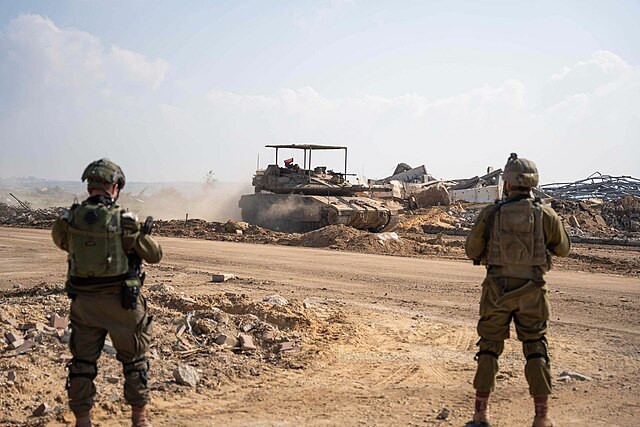Israeli airstrikes killed at least 60 people across Gaza on Tuesday, according to local medics, as international condemnation escalated over the country's renewed military offensive in the Hamas-controlled enclave. Targets included homes and a school sheltering displaced families, with many of the victims reported to be women and children.
Strikes pounded the central city of Deir al-Balah and the Nuseirat refugee camp, where 13 and 15 people were killed, respectively, according to Al-Aqsa Martyrs Hospital. Additional strikes on Khan Younis in the south killed 10 more, while two blasts in northern Gaza struck a family residence and a school-turned-shelter, killing 22, more than half of whom were women and children, Gaza health officials said.
Footage from Gaza City showed residents combing through rubble at the Daraj neighborhood school, where charred belongings, including a red teddy bear, were scattered among debris. "What is our fault? What is the fault of children? What is the fault of the women we found on the stairs with their hair and clothes torn and burned?" said Omar Ahel, who had been sheltering at the school.
The Israeli military, which has warned of an "unprecedented attack" in southern Gaza, had no immediate comment on the strikes. More than 500 people have been killed in the past eight days, according to medics, and over 53,000 Palestinians have died since the war began, Gaza's Health Ministry reports.
The war, which erupted after Hamas-led militants killed 1,200 people and took 251 hostages in Israel on October 7, 2023, has devastated the Gaza Strip and displaced nearly all of its 2.3 million residents. Israel says it aims to dismantle Hamas and secure the release of the remaining 58 hostages, about one-third of whom are believed to be alive.
Israel's conduct is drawing rare rebukes from close allies. On Monday, Britain, France, and Canada warned of potential sanctions if the current assault and humanitarian restrictions persist. "This must stop," French Foreign Minister Jean-Noël Barrot said Tuesday. Aid must be "immediate, massive and without any hindrance."
The United Nations said Israel approved entry for 100 aid trucks Tuesday following a two-and-a-half-month blockade. However, only five trucks crossed into Gaza, according to Jens Laerke, spokesperson for the U.N. humanitarian agency OCHA, who said they were still not distributed.
Louise Wateridge of UNRWA said distribution centers and warehouses have been empty for weeks. "Everything's empty," she said from a Jordan facility stocked with food for 200,000 people that could be delivered to Gaza within hours.
Israeli Prime Minister Benjamin Netanyahu, facing global backlash, defended the campaign, calling it a "war of civilization over barbarism." He insisted that Israel would "continue to defend itself by just means until total victory."
Internally, dissent is growing. Yair Golan, a retired general and leader of the opposition Democrats party, told Reshet Bet radio, "A sane country doesn't engage in fighting against civilians, doesn't kill babies as a hobby and doesn't set for itself the goals of expelling a population." His remarks prompted Netanyahu to accuse him of "echoing disgraceful antisemitic blood libels."
The Israeli military issued a statement saying Chief of Staff Eyal Zamir "condemns any statement casting doubt on the values of the military and the morality of its soldiers."
Gaza's humanitarian crisis has also reignited calls within Europe to reassess diplomatic and trade relations with Israel. France is reportedly considering revisiting its association agreement with the Israeli government, a move that could have significant geopolitical implications.






